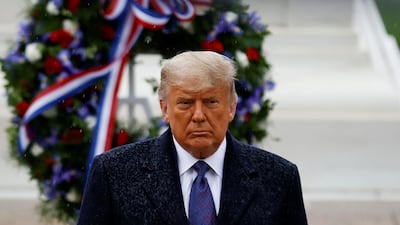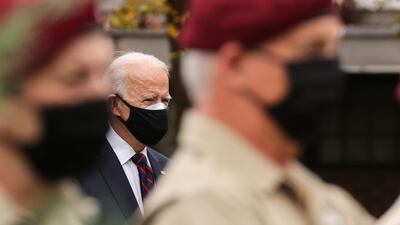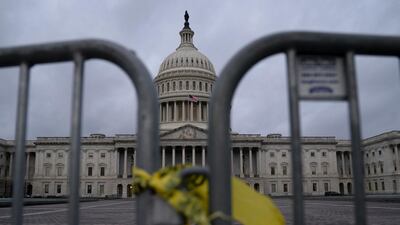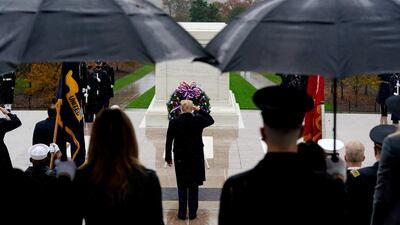President Donald Trump has not authorised president-elect Joe Biden to see the ultra-secret daily presidential briefs that give an overview of the nation’s most sensitive intelligence.
National security and intelligence experts hope Mr Trump, who is contesting the election result, decides to return to tradition because an incoming president needs to be fully prepared to confront any national security issues from the first day.
“Our adversaries aren’t waiting for the transition to take place,” says former Michigan Republican Mike Rogers, who was chairman of the House intelligence committee.
“Joe Biden should receive the President’s daily brief starting today.
"He needs to know what the latest threats are and begin to plan accordingly. This isn’t about politics, this is about national security.”
Adversaries could take advantage of the US during a presidential transition and key foreign problems will be bearing down on Mr Biden from the moment he steps into the Oval Office.
Unless Mr Trump extends or negotiates a new nuclear arms accord with Russia before inauguration day, on January 20, Mr Biden will have 16 days before the last remaining treaty for the world’s two largest nuclear arsenals expires.
The president’s daily brief summarises high-level, classified information and analysis on national security issues. It has been offered to presidents since 1946.
It is co-ordinated and delivered by the Office of the National Intelligence Director with input from the CIA and other agencies.
It is tailored for each president, depending on whether they prefer oral or written briefs or both, short summaries or long reports, on paper or electronically.
Having access to the brief also could help Mr Biden to craft a possible response to North Korea, which has a history of firing off missiles or conducting nuclear tests shortly before or after new presidents take office.
He has decades of experience in foreign affairs and national security, but he has probably not been privy to the latest details of how Iran is back to enriching uranium, or cyber attack operations of foreign powers.
Mr Biden is trying to play down the significance of the delay in getting access to the briefing.
“Obviously the PDB would be useful but, it’s not necessary. I’m not the sitting president now,” Mr Biden said on Tuesday.
He did not say whether he had tried to contact Mr Trump on this or any other matter, saying only: “Mr President, I look forward to speaking with you.”
“Look, access to classified information is useful but I’m not in a position to make any decisions on those issues anyway,” Mr Biden said.
“As I said, one president at a time. He will be president until January 20. It would be nice to have it but it’s not critical.”
Several Senate Republicans have joined called for Mr Biden to get access to the intelligence briefings.
Senator Lindsey Graham, a close ally of Mr Trump, told CNN on Thursday that he thought Mr Biden should be given intelligence briefings starting now.
“Yeah, I think he should,” Mr Graham said.
Republican Senator James Lankford predicted that the issue will be resolved soon.
“I’ve already started engaging in this area," Mr Lankford told KRMG in Oklahoma, on Wednesday.
"And if that’s not occurring by Friday, I will step in and push and say this needs to occur so that regardless of the outcome of the election, whichever way that it goes, people can be ready for that actual task."
He said vice president-elect Kamala Harris should also be given the briefings, which should not be a problem because she already had security clearances as a member of the Senate intelligence committee.
The office of National Intelligence director John Ratcliffe said it could not begin talking with the Biden transition team until a federal agency started the process of transition, which the Trump administration was delaying.
The office, which oversees more than a dozen US intelligence agencies, said it must follow the Presidential Transition Act, which requires the General Services Administration to ascertain the winner of the election, which Mr Trump is contesting.
its administrator, Emily Murphy, who was appointed by Mr Trump, has not yet officially declared Mr Biden the president-elect.
Intelligence agencies have given generalised intelligence briefings, without information on covert operations and sources and methods, to presidential nominees since 1952.








